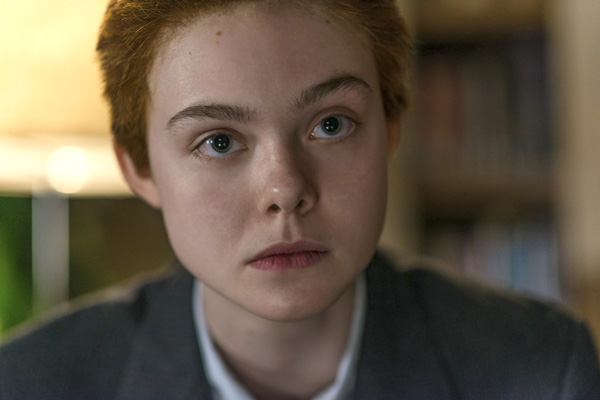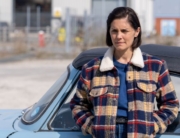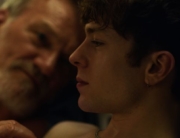Three generations of women live together in a cramped house in New York City’s East Village: Dolly (Susan Sarandon) and Frances (Linda Emond) are the lesbian grandmothers who own the house, and Maggie (Naomi Watts) is the single mother raising a daughter who has decided to begin hormonal treatment to transition into a boy. Sixteen-year-old Ray (Elle Fanning) has already been living as a male for two years. Now he is ready to take the next step: to begin taking testosterone (“T,” as Ray calls it) and transfer to a new school where no one will know he used to be a girl.
The script by director Gaby Dellal (Angel’s Crest, On a Clear Day) and Nikole Beckwith toggles between the debates at home and the pursuit of finding Ray’s estranged father and getting him to sign the medical consent form. Grandmother Dolly is a proud, über liberal lesbian who didn’t come out until she was well into adulthood. As a twist on this family drama, Dolly is the main voice of dissent in Ray’s sexual reassignment. At how many American dinner tables would you ever hear the question, “Why can’t she just be a lesbian?”
Maggie’s own life is a wreck. She’s been mooching off her mother ever since she left Ray’s father 14 years ago, and can’t hold a relationship (as Dolly remarks, she often held several at once). Since her daughter came out as a trans boy, Maggie has gone through all the necessary steps with him. Now to get Ray on T, Maggie has to reconnect with the man she threw out of her life 14 years before. Craig (Tate Donovan) is living in a suburb just outside of the city in a cozy house with a wife and three children of their own.
When Maggie tracks him down and drops in on him, confronting him with the revelation of Ray’s transition, the man is completely blindsided. Maggie and Ray will have to catch Craig up on the last 14 years in only a few days before they have to return the consent form in time for Ray to go on T before he starts over at the new school. Only thing is, if Craig says no, that gives Maggie the perfect excuse to not have to sign it herself.
Accolades should go to the screenplay, which evenly doles out credence to each character’s opinions; everyone is right, in his or her own way. But in such a sensitive decision, the debate shouldn’t be about who’s right; it needs to be about what’s best. As Maggie blurts out during one emotionally explosive scene, “What if she commits suicide?” (an ongoing motif is the adults forgetting to refer to Ray with his new pronoun). After all, a transgender identity crisis is not something parents can afford to sweep under the rug. Trans people are statistically more likely to commit suicide, but are also more likely to be victims of bullying, random acts of violence, and murder.
Performance-wise, everyone is on-point. Sarandon and Emond complement each other well as the pretty-much-retired couple who spend their days nursing glasses of liquor, basking in the retirement they have earned. Watts’s Maggie wears her hair frazzled, and her eyes are darkened and weary, not just from being a single mother, living under her successful mother’s roof, but from pouring everything into her child’s life as a way of avoiding having her own.
A lot of thought went into the set design, too. Dolly and Frances’s part of the house is fully decorated and inviting. Maggie and Ray’s upper levels look jimmy-rigged, as if Maggie can’t even bring herself to put her home in order. Never mind Ray’s room, which has starkly blank walls covered in angsty graffiti. One look at that room and you’ll be glad you’re not a teenager anymore.
Fanning is pretty remarkable as Ray. Clearly the actress did her homework, and she shows a lot of nuance in her performance. Thanks to the script, there are a lot of interesting choices for Ray. He isn’t some altruistic valedictorian type. That the boy Ray chooses to be is a skater punk who is into DJ’ing and also works on a video diary is a smart tweak. Also, at times Ray can act like a cranky little brat, which adds another level of complexity.
Being a gay man who came out when I was 16, and having dealt with the urgings of adult relatives to stay in the closet until college, that maybe I was “just going through a phase,” I will posit this: Ray is a frustrated, weird little mess because we are seeing him in his pretransition phase. Once he gets on T, moves to that new school, makes new friends, and has the support of those that surround him, he will become the man he was meant to be.

















Leave A Comment